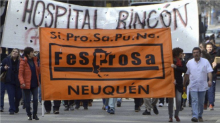Argentina: National Day of Protest for better health and working conditions

The Federation of Trade Unions of Health Professionals of the Argentine Republic (FESPROSA) organised a national day of protest with strikes and mobilizations on 19 April.
The union’s demands included 35% increment in wages to take account of inflation; stopping precarious work in the region; need for action against rising homelessness in the country; adequate pensions for retired health workers, and rejection of the imposition of a false Universal Health Coverage (CUS).
Over the past months, branches of FESPROSA in more than 600 hospitals and hundreds more health centres across several regions in Argentina carried out mass actions against precarious work.
More than 30,000 health professionals attending to the most vulnerable sections of the population have continued to work under precarious conditions, and this is not acceptable.
The national action taken by FESPROSA on April 19 drew massive support, including from the Movement for the Right to Health. More than 10,000 members of the Association of Health Professionals in the Province of Buenos Aires (CICOP/FESPROSA) withdrew their services.
Similar actions were taken in La Rioja, Nuequen, Chaco, Santa Cruz and Formosa. In Rosario, the Movement for the Right to Health, SIPRUS, and other civil society organisations demonstrated alongside FESPROSA activists. In the rest of the country, mass assemblies were held in health facilities.
Jorge Yabkowski, President of FESPROSA, said, “We demand at least a 35 percent increase. The ceiling of 18 percent on salary increases which the national government wants to impose this year is unjust. With inflation rate forecast to be at least 25 percent, what this ceiling actually means is a pay cut. We equally demand a substantial and emergency increase of the health budget due to the crisis of the hospital system and primary care centres nationwide.”

